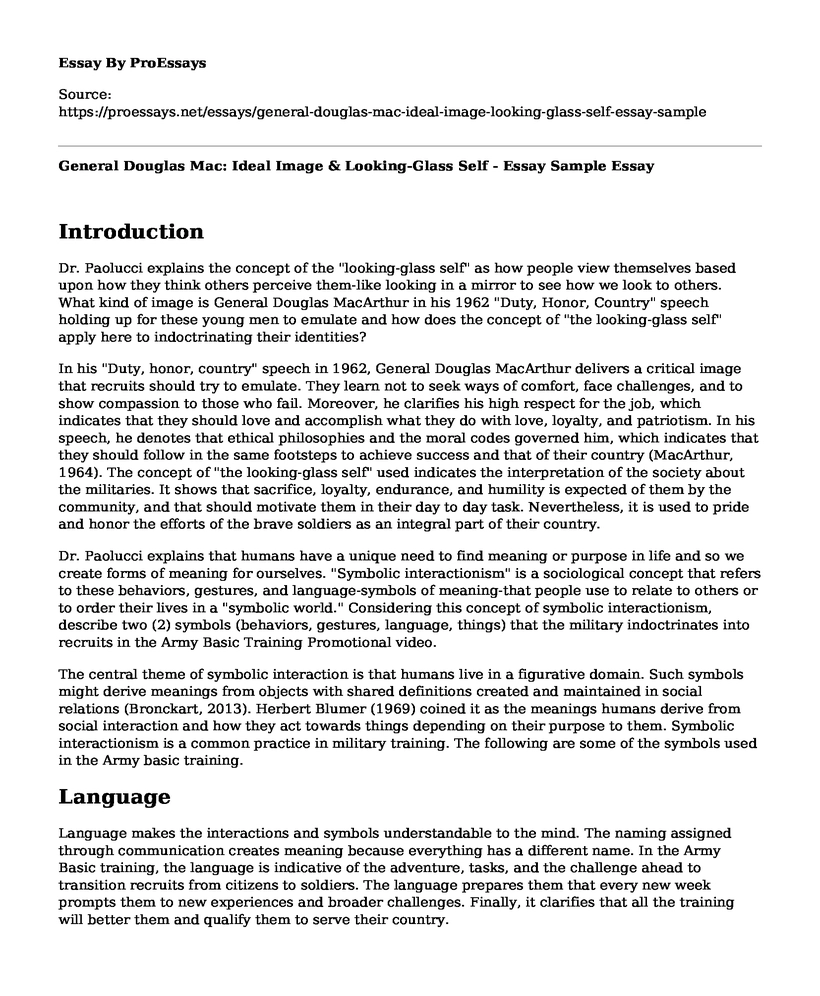Introduction
Dr. Paolucci explains the concept of the "looking-glass self" as how people view themselves based upon how they think others perceive them-like looking in a mirror to see how we look to others. What kind of image is General Douglas MacArthur in his 1962 "Duty, Honor, Country" speech holding up for these young men to emulate and how does the concept of "the looking-glass self" apply here to indoctrinating their identities?
In his "Duty, honor, country" speech in 1962, General Douglas MacArthur delivers a critical image that recruits should try to emulate. They learn not to seek ways of comfort, face challenges, and to show compassion to those who fail. Moreover, he clarifies his high respect for the job, which indicates that they should love and accomplish what they do with love, loyalty, and patriotism. In his speech, he denotes that ethical philosophies and the moral codes governed him, which indicates that they should follow in the same footsteps to achieve success and that of their country (MacArthur, 1964). The concept of "the looking-glass self" used indicates the interpretation of the society about the militaries. It shows that sacrifice, loyalty, endurance, and humility is expected of them by the community, and that should motivate them in their day to day task. Nevertheless, it is used to pride and honor the efforts of the brave soldiers as an integral part of their country.
Dr. Paolucci explains that humans have a unique need to find meaning or purpose in life and so we create forms of meaning for ourselves. "Symbolic interactionism" is a sociological concept that refers to these behaviors, gestures, and language-symbols of meaning-that people use to relate to others or to order their lives in a "symbolic world." Considering this concept of symbolic interactionism, describe two (2) symbols (behaviors, gestures, language, things) that the military indoctrinates into recruits in the Army Basic Training Promotional video.
The central theme of symbolic interaction is that humans live in a figurative domain. Such symbols might derive meanings from objects with shared definitions created and maintained in social relations (Bronckart, 2013). Herbert Blumer (1969) coined it as the meanings humans derive from social interaction and how they act towards things depending on their purpose to them. Symbolic interactionism is a common practice in military training. The following are some of the symbols used in the Army basic training.
Language
Language makes the interactions and symbols understandable to the mind. The naming assigned through communication creates meaning because everything has a different name. In the Army Basic training, the language is indicative of the adventure, tasks, and the challenge ahead to transition recruits from citizens to soldiers. The language prepares them that every new week prompts them to new experiences and broader challenges. Finally, it clarifies that all the training will better them and qualify them to serve their country.
Gesture
One of the most significant symbols in social interactionism is a gesture, usually the vocal gesture (Bronckart, 2013). In the video, gestures help recruits understand some of the fundamental processes such as vaccinations, haircuts, and medical completion before commencing with their initial training. It indicates that army training is a series of different training, and upon completion of one step, you are allowed to go to the next level. Therefore, it indicates their success is only achievable through hard work.
References
Bronckart, J. P. (2013). Units of analysis in psychology and their interpretation: Social interactionism or logical interactionism. In Piaget Vygotsky (pp. 93-114). Psychology Press.
MacArthur, D. (1964). Duty, honor, country. Armed Forces Information and Education, Department of Defense.
Cite this page
General Douglas Mac: Ideal Image & Looking-Glass Self - Essay Sample. (2023, Feb 27). Retrieved from https://proessays.net/essays/general-douglas-mac-ideal-image-looking-glass-self-essay-sample
If you are the original author of this essay and no longer wish to have it published on the ProEssays website, please click below to request its removal:
- Values and Social Location Reflection Essay
- The Physiology of Stress - Essay Sample
- Essay on Online Training Course: A Step Towards Suicide Prevention in Youth
- Childhood Abuse and Depression: Annotated Bibliography
- Fatigue: Physical & Mental Weariness Causes & Impact - Research Paper
- Essay on Good Behaviors, Bad Behaviors: A Social Learning Theory Perspective
- Five-Factor Model of Personality - Research Paper Sample







